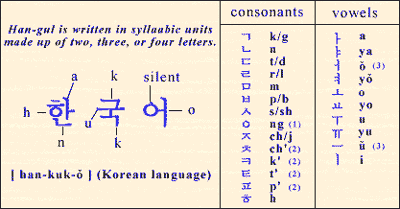Korean
PostPosted: Wed Apr 19, 2006 7:29 pm
K, I decided recently that in addition with maintaining my Japanese language studies, I am going to learn the basics of writing and speaking Korean.
My question is, for those who know a bit about it, is thier writing system similar in construction of words to Japanese? Such as you have the character "su" in Japanese so for Sumimasen, you would have the character "su" in there. For Korean, without touching the Hanja, is it smiliar in construction? I did some research on Hangul and it seems comperable to Hirigana and Katakana. So when constructing the word Shik-sah (meal), would you write the indivdual character for Shik-sah using Hangul? I am just a tad bit perplexed about thier writing system so any advice, hints, or suggestions is welcomed. As well, if you have any good sites that provide Hangul lessons and vocab with sound bytes in how to say is much appreciated.
Thanks.
My question is, for those who know a bit about it, is thier writing system similar in construction of words to Japanese? Such as you have the character "su" in Japanese so for Sumimasen, you would have the character "su" in there. For Korean, without touching the Hanja, is it smiliar in construction? I did some research on Hangul and it seems comperable to Hirigana and Katakana. So when constructing the word Shik-sah (meal), would you write the indivdual character for Shik-sah using Hangul? I am just a tad bit perplexed about thier writing system so any advice, hints, or suggestions is welcomed. As well, if you have any good sites that provide Hangul lessons and vocab with sound bytes in how to say is much appreciated.
Thanks.

 But at hangul hakyo, they're teaching everyone to read and write it and such, so I'm out of luck there
But at hangul hakyo, they're teaching everyone to read and write it and such, so I'm out of luck there 